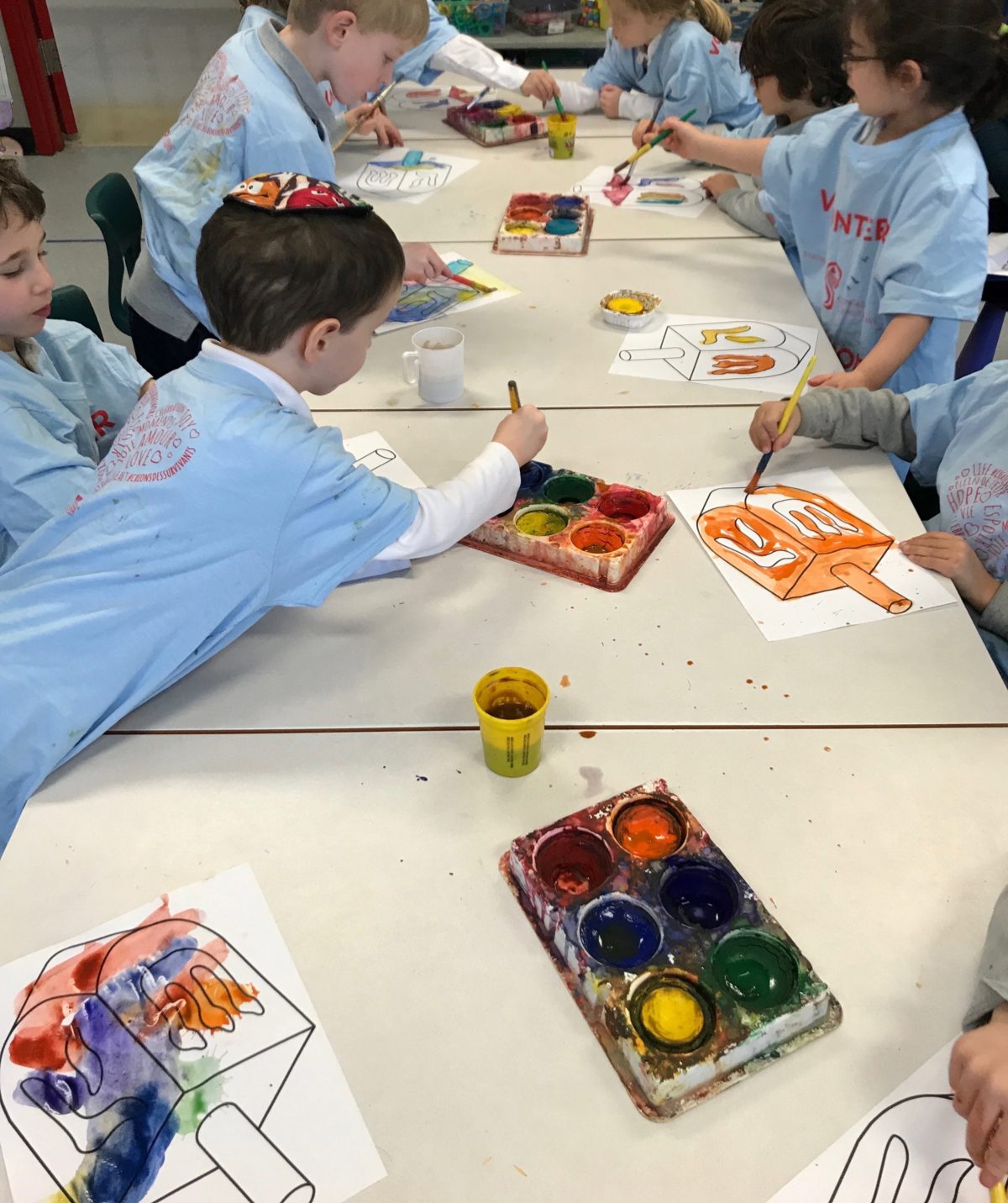How amazing it is to have five full days of school in a week!
As joyous as the holiday season is – both here in school and at home – it is a lovely thing to be able to resume the regular rhythms of school. This time of year it almost feels like a second beginning to the school year as we are now able to fully inhabit schedules and string together sufficient contact time to bring meaningful projects to life. It is also wonderful to have put behind us much of the business of carpool lines, Google Classroom, hot lunch, parent communication procedures, PTA structure, behavioral expectations, care of the physical facility – so many of the preconditions for the transformational work ahead are sliding into place that we can take a collective breath and move forward.
We have discussed in prior posts as well as through many public and private forums of the need for OJCS to clarify its “Jewish mission and vision”. Let’s take a few minutes to unpack what that means…
Doesn’t OJCS currently have a Jewish mission/vision?
Yes.
From our Parent Handbook:
Vision Statement:
The Ottawa Jewish Community School is dedicated to enriching the life of its students along with strengthening their character and instilling their love for Israel. Inspired by Jewish values and heritage, a love of learning, and guided by teaching excellence, students reach for their potential, in order to become the leaders of tomorrow, and responsible citizens of the world.
Mission Statement
The Ottawa Jewish Community School is an all day, trilingual elementary school that aims to develop academic and personal excellence in its students, in an inclusive, caring, and pluralistic environment that is based on Jewish religion, culture and values.
The school’s mission is summarized in the OJCS community themes;
RESPECT, RESPONSIBILITY, REACHING FOR EXCELLENCE.
CORE VALUES
Talmud Torah / Love of Study: Lifelong learning rooted in Jewish and secular studies, emphasizing critical thinking, problem solving and creativity.
Kevod HaBriyot / Respect for Humanity: Living and learning in ways defined by decency, kindness, respect for oneself and others, and honouring diversity.
Ahavat Yisrael / Love of Israel: Centrality of the State of Israel to Jewish identity, and a deep connection to its people, land, and history.
Chashivut HaIvrit / Importance of Hebrew: Recognition of Hebrew as a living language, integral to Jewish life, and an essential link to Jewish texts, prayer, and modern Israel.
Tikkun Olam / Repairing the World: Instilling social responsibility and an engagement with the global community built upon the foundation of tzedakkah (charity), chesed (good deeds), compassion, and courage.
Mi Dor Le Dor / From Generation to Generation: Fostering Jewish continuity and instilling Jewish identity and a sense of peoplehood by transmitting traditions, participating in rituals, and engaging with the Jewish community at home and around the world.
So what’s the problem?
Let’s take a closer look…
Chashivut HaIvrit / Importance of Hebrew: Recognition of Hebrew as a living language, integral to Jewish life, and an essential link to Jewish texts, prayer, and modern Israel.
There are many ways OJCS could seek to live this value. What does “recognition” really mean? Does it mean that all students should learn to speak, read and write modern Hebrew? Does it mean that all Judaics classes should be taught with Hebrew as the language of instruction? What are the outcomes for Hebrew literacy that parents should expect through this core value?
Without further clarification, it is hard to know.
…pluralistic environment that is based on Jewish religion, culture and values.
What does OJCS believe to be true about “pluralism”? What is a “pluralistic environment”? Does it mean recognizing the diversity of our students as an audience? Does it mean the responsibility for creating experiences reflective of each denominational affiliation (as well as unaffiliated)? Are we a melting pot? A stew? Individual bowls?
Without further clarification, it is hard to know.
OK, so we go ahead and clarify our values. Is that the task?
Not entirely.
Time is a zero sum game. So even if/when we clarify each value and/or add new ones…how do we know what to prioritize by way of our time and outcomes?
For example…
Is Hebrew the most important academic subject within Jewish Studies? You might think so by virtue of its mention in the overall mission as a “trilingual” school. But is it? And should it be? It is likely true that our school would look very different, especially at the K-5 level, if Hebrew literacy was the highest value.
What else?
Where does tefillah live in all of this? It is interesting in and of itself that it is not explicitly named in the mission, vision or values. And yet from our conversations with parents and rabbis, there is clearly a felt need that students who attend a Jewish day school should come out with basic prayer and synagogue fluencies. If that is true, it will need to wind up as an explicit value with a specific curriculum and schedule. (In the meanwhile, as we have shared, it has been restored to the daily schedule.)
What does this have to do with the day-to-day teaching and learning?
Great question, hypothetical question-asker!
Unlike the work we do in secular education (which will also require revisiting and re-clarifying), there is no external set of benchmarks and standards that we are required to follow. There are no universally adopted textbooks or curricular materials shared by all Jewish day schools (or even by traditional groupings of Jewish day schools). We have to translate our school’s mission-vision-philsosophy into self-created (or borrowed) academic benchmarks and standards. We have to build a schedule around those outcomes. We have to choose curricula based on what we believe to be true about teaching and learning. Etc.
But the school is 69 years old. Surely it already has all of those things.
Kind of.
Like we have discussed in prior posts, the school has frequently added layers of program on top of program…it has done a great job of cluttering…not the best job of de-cluttering. So, yes, there are written descriptions of different strands of our Jewish Studies curriculum, but there really is not one coherent document – either for internal or external purposes – that actually describes what we do. And that’s a problem.
By the way, it does not mean that excellent teaching and learning isn’t happening in each of our grades in Jewish Studies! No one should think that this is some kind of lost year. We have talented and dedicated teachers working hard to provide a high-quality rigorous Jewish academic education and meaningful Jewish experiences. Good things are happening. But we need to move from “good to great”.
How will the work of clarification take place?
That’s where you (will) come in.
There are a number of critical stakeholder groups that we will call upon to contribute to this work. They include our community’s rabbis, soon to be invited to an Ad-Hoc Rabbinic Advisory Committee. They include our Jewish Studies Faculty, already beginning to do its due diligence on what was, what is and what could be. They include our institutional partners, synagogues, our pipeline schools and Federation. And they include our families – current and prospective. Vehicles will be created to onboard the feedback and recommendations from all these critical stakeholder groups.
The process through which these groups form and do their work will be shared and transparent. The feedback and recommendations will ultimately go to the OJCS Board of Trustees who, ultimately as charged by their role, will (re)establish the Jewish mission and vision for OJCS. That, too, will be proudly and transparently shared out with our full community. With that clarification will come the charge to the administration and faculty to bring that mission and vision to life. And, surprise, that will also be transparent.
If we are passionate about this, what can we do in the meanwhile?
Talk about it! Share your thoughts! (Comment on this blog post.) Make an appointment to come see us. What can be better than talking with people who are invested in our Jewish mission and vision? What topic can be more important for us to discuss?
At the end of the day…there is no reason for this school to exist if not for the “J”. We realize that that doesn’t necessarily mean that the “J” is everyone’s first priority. But, still. There is no reason for OJCS to be a Jewish day school, if not to be Jewish. Not Jew-ish. Jewish.
What does that mean? We’ll find out together.









 NewOrg and less and less from us as the transition from what was to what will be grows closer each day. Critical information about “Membership”, “Conference”, “Fee For Service”, “Staffing”, etc. – the stuff you really need to know in order to better understand your engagement with NewOrg next year and beyond is finally making its way to the field. And not a moment too soon (and maybe a few moments too late) considering our earliest schools are already beginning to close for the summer.
NewOrg and less and less from us as the transition from what was to what will be grows closer each day. Critical information about “Membership”, “Conference”, “Fee For Service”, “Staffing”, etc. – the stuff you really need to know in order to better understand your engagement with NewOrg next year and beyond is finally making its way to the field. And not a moment too soon (and maybe a few moments too late) considering our earliest schools are already beginning to close for the summer. We don’t know exactly what or who the future will bring. But we know what the past and present has meant. On behalf of the staff and the board of the Schechter Day School Network, let me thank all our stakeholders one last time and to be clear that we are not saying shalom, but l’hitraot.
We don’t know exactly what or who the future will bring. But we know what the past and present has meant. On behalf of the staff and the board of the Schechter Day School Network, let me thank all our stakeholders one last time and to be clear that we are not saying shalom, but l’hitraot.


